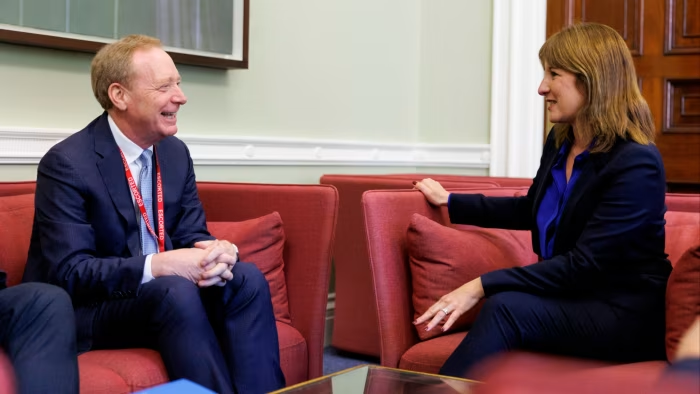Unlock the Editor’s Digest for free
Roula Khalaf, Editor of the FT, selects her favourite stories in this weekly newsletter.
Chancellor Rachel Reeves has urged business leaders to start talking up Britain or risk letting Nigel Farage into Downing Street, as the Treasury released comments by Microsoft president Brad Smith calling the UK a “force for stability in an uncertain world”.
UK business leaders told the Financial Times that the pressure from Reeves and her team to put forward a positive narrative around the British economy had intensified in the run-up to the November Budget, when the chancellor is expected to raise taxes.
The Treasury has warned business that Farage’s rightwing populist Reform UK party, which is leading in polls, would only benefit from a sense of economic gloom, they added.
“We’ve been told that if you want to talk down the economy it will only help Reform, and do you want that as the alternative?” one business leader said.
One chief executive said he had been at a recent roundtable where Treasury aides had expressly asked leaders to publicly welcome government initiatives that could be seen as supportive for their industry and the economy.
An ally of Reeves confirmed the message to business: “If you want to join the chorus of talking Britain down, we know where that road leads. It’s not a good place.”
Labour officials claim that Farage would undermine institutions such as the Bank of England, lose control of the public finances and unravel trade deals, including the attempt by Prime Minister Sir Keir Starmer to rebuild trading ties with Europe after Brexit.
Reform did not immediately comment, but the party has been wooing business in the past few months, insisting that policies such as cutting state spending and taxes and boosting North Sea oil drilling would be welcomed by the corporate world.
Many business leaders have accused Reeves of hobbling the economy, notably with a £25bn rise in employer national insurance contributions and a package of new workplace rights.
They also note that Reeves herself talked the economy down after becoming chancellor, claiming she was being forced to take emergency action to fill a £22bn fiscal hole. Starmer and other ministers claimed that aspects of Britain were “broken”.
“Businesses absolutely have the right to say when they are worried or concerned,” the Reeves ally said. “But they also have a chance to say when things are going right and agree with us.”
The OECD forecasts that Britain will have the second-fastest growth in the G7 in 2025 overall, though the pace has slowed through the year, with GDP growth of just 0.2 per cent in the three months to July.
Inflation has remained well above the Bank of England’s target at 3.8 per cent as of August, sapping household spending power and reducing the chances of further interest rate cuts.
Business investment was up by 3 per cent in the second quarter compared with the previous year.
In the past week the Treasury has engaged in a City charm offensive and shared videos of bosses including Conor Hilery, co-chief executive of JPMorgan’s Emea business, touting the UK as an “increasingly attractive” place in which to allocate capital.
He adds in the video shared by the Treasury on LinkedIn: “And that’s, you know, to a large extent off the back of the government policies, pro-growth, pro-business, pro-investment.”
Reeves also said on LinkedIn this week that she had met with Smith of Microsoft, saying this showed the UK was “continuing to attract the most innovative companies to our shores. We are putting Britain at the cutting edge”.
The Treasury said on Friday that Smith had told Reeves he thought Britain had become “a force for stability in an uncertain world”.
Microsoft said last month it intends to invest £22bn over the next four years in the UK. Smith in 2023 publicly denounced a decision by the UK’s competition regulator to block Microsoft’s takeover of Activision, saying the EU was a better place in which to start a business. The deal was later cleared.
Reeves recently boasted about “getting rid” of Competition and Market Authority chair Marcus Bokkerink. He was ousted by the government in January.

